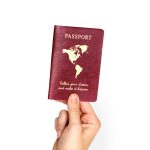Table of Contents
Imagine waking up to a hefty fine and a stern letter from the tax authorities. Your crime? Simply working from your laptop in paradise. Welcome to the murky world of digital nomad taxation.
The Invisible Tightrope of Global Mobility
As a digital nomad, you’re living the dream – hopping from one exotic locale to another, laptop in tow. But while you’re sipping coconut water on a Thai beach or coding from a Parisian café, tax authorities worldwide are scrambling to keep up with your lifestyle. And they’re not always playing nice.
Many countries are tightening their grip on remote workers. What seemed like a harmless workcation could land you in hot water faster than you can say “digital nomad visa.” Here’s the kicker—most nomads don’t even realize they’re breaking the law until it’s too late.
The Murky Waters of Residency
Are you off the hook because you’re not staying put? Think again. Tax residency is more than just where you lay your head at night. It’s a complex web of factors that can trap even the most well-intentioned globetrotter.
Many countries use the “183-day rule” as a starting point. Spend more than half the year in one place, and you might be considered a tax resident. But it’s not always that simple. Some nations count cumulative days over several years. Others look at factors like where your “center of vital interests” lies – fancy talk for where your life is most connected.
And here’s a shocker – you could simultaneously be a tax resident of multiple countries. Suddenly, that carefree nomad lifestyle doesn’t seem so breezy.
The Digital Nomad Visa Conundrum
Enter the digital nomad visa – the supposed silver bullet for location-independent workers. Countries from Estonia to Barbados are rolling out the red carpet for remote workers. Sounds perfect, right?
Not so fast. While these visas offer a legal way to work remotely, they often come with their tax implications. Some require you to pay local taxes, while others exempt you – but might affect your tax status back home. It’s a delicate balance that requires careful navigation.
And here’s the rub – many of these visas are so new that even local authorities are still figuring out the kinks. You could be a guinea pig in a global tax experiment.
The Hidden Costs of Freedom
Let’s talk money. The nomad lifestyle might seem like a ticket to tax freedom, but it can actually lead to a heftier bill. Here’s why:
- Double taxation: Without proper planning, you could end up paying taxes on the same income in multiple countries. Ouch.
- Lost benefits: By severing ties with your home country, you might lose access to social security, healthcare, and other benefits you’ve been paying into for years.
- Compliance costs: Keeping up with tax obligations in multiple jurisdictions often means hiring expensive international tax experts.
- Currency fluctuations: Earning in one currency and paying taxes in another? You’re now at the mercy of forex markets.
The price of freedom can be steep, and it’s often paid in unexpected ways.
The Crackdown Cometh
Tax authorities aren’t blind to the digital nomad boom. They’re beefing up their enforcement game, and the consequences of non-compliance are getting steeper.
Countries are sharing more information than ever before. The Common Reporting Standard (CRS) allows over 100 nations to exchange financial data automatically. Your offshore account isn’t as hidden as you might think.
Some nations are going even further. The US, for example, requires citizens to report foreign bank accounts exceeding certain thresholds. Fail to do so, and you could face eye-watering penalties.
And let’s not forget about the freelance platforms and payment processors you rely on. They’re increasingly cooperating with tax authorities, leaving a digital trail that’s hard to erase.
The Writing on the Wall
Social media – the digital nomad’s best friend and potential worst enemy. Those envious beach selfies and co-working space check-ins? They’re a goldmine for tax investigators.
In recent years, tax authorities have ramped up their social media surveillance. They’re using AI and big data to cross-reference your online activity with your tax returns. That innocent Instagram story could be the smoking gun in a tax evasion case.
It’s not just about catching cheats. Even honest mistakes can come back to haunt you when your online life doesn’t match your tax declarations.
Navigating the Nomad Tax Maze
So, how do you enjoy the nomad lifestyle without ending up in a legal tangle? Here are some key strategies:
- Know your status: Understand the tax residency rules for every country you visit. It’s tedious but essential.
- Track everything: Keep meticulous records of your travels, income, and expenses. You never know when you’ll need to prove where and what you were doing.
- Seek expert help: International tax law is complex. Investing in professional advice can save you a fortune in the long run.
- Stay informed: Tax laws for digital nomads are evolving rapidly. What was true last year might not apply today.
- Consider a home base: A “tax home” can simplify your obligations and provide a safety net.
- Be transparent: When in doubt, disclose. It’s better to overshare with tax authorities than to hide information.
The Future of Nomad Taxation
The digital nomad phenomenon isn’t going away, and governments know it. More countries will likely adapt their tax systems to this new reality. Some predict a future where your tax obligations follow you seamlessly across borders based on real-time location data.
Others envision competing “nomad hubs” – countries vying for your presence with attractive tax packages and digital infrastructure. The future of work is mobile, and the future of taxation must keep pace.
Don’t Let the Taxman Clip Your Wings
The nomad lifestyle offers unparalleled freedom and opportunity. But with great freedom comes great responsibility – especially regarding taxes. By staying informed and proactive, you can keep exploring the world without looking over your shoulder for the taxman. Remember, the goal isn’t to avoid taxes altogether. It’s about paying your fair share while maximizing the benefits of your global lifestyle.
So, before packing your bags for your next adventure, ensure your tax affairs are in order. Your future self – and your bank account – will thank you.

I’m Ethan, a 42-year-old digital marketer and dad of two, living in Dublin. My passion is planning adventurous family vacations that combine cultural immersion with outdoor activities. With my kids growing into their teenage years, I’m dedicated to creating experiences that they’ll remember for a lifetime. ExploreWorkTravel is my platform to share tips, stories, and insights to help other families make the most of their travel experiences.




